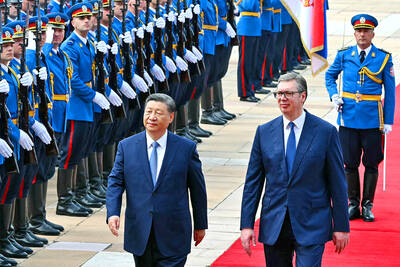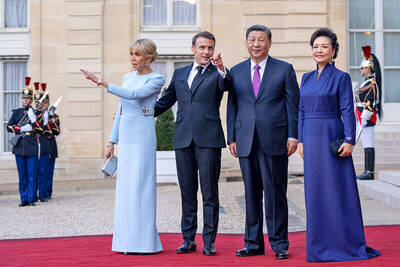When leaders gather this week in Los Angeles at the Summit of the Americas, the focus is likely to veer from common policy changes — migration, climate change and galloping inflation — and instead shift to something Hollywood thrives on: the drama of the red carpet.
With Mexican President Andres Manuel Lopez Obrador topping a list of leaders threatening to stay home to protest the US’ exclusion of authoritarian leaders from Cuba, Nicaragua and Venezuela, experts say the event could turn into a embarrassment for US President Joe Biden.
Even some progressive Democrats have criticized the administration for bowing to pressure from exiles in the swing state of Florida and barring communist Cuba, which attended the previous two summits.

Photo: Reuters
“The real question is why the Biden administration didn’t do its homework,” said Jorge Castaneda, a former Mexican minister of foreign affairs who now teaches at New York University.
While the Biden administration insists the president in Los Angeles would outline his vision for a “sustainable, resilient and equitable future” for the continent, Castaneda said it is clear from the last-minute wrangling over the guest list that Latin America is not a priority for the US president.
“This ambitious agenda, no one knows exactly what it is, other than a series of bromides,” he said.
The US is hosting the summit for the first time since its launch in 1994, in Miami, as part of an effort to galvanize support for a free-trade agreement stretching from Alaska to Patagonia, but that goal was abandoned more than 15 years ago amid a rise in leftist politics in the region.
With China’s influence expanding, most nations have come to expect — and need — less from Washington. As a result, the premier forum for regional cooperation has languished, at times turning into a stage for airing historical grievances, like when then-Venezuelan president Hugo Chavez at the 2009 summit in Trinidad and Tobago gave then-US president Barack Obama a copy of Eduardo Galeano’s classic tract The Open Veins of Latin America: Five Centuries of the Pillage of a Continent.
The US opening to former Cold War adversary Cuba, which was sealed with Obama’s handshake with then-Cuban president Raul Castro at the 2015 summit in Panama, lowered some of the ideological tensions.
“It’s a huge missed opportunity,” Ben Rhodes, who led the Cuba thaw as deputy national security adviser in the Obama administration, said on his Pod Save the World podcast. “We are isolating ourselves by taking that step because you’ve got Mexico, you’ve got Caribbean countries saying they’re not going to come — which is only going to make Cuba look stronger than us.”
To bolster turnout and avert a flop, Biden and US Vice President Kamala Harris have been working the telephones, speaking with the leaders of Argentina and Honduras, both of whom initially expressed support for Mexico’s proposed boycott.
Former US senator Christopher Dodd has also crisscrossed the region as a special adviser for the summit, in the process convincing Brazilian President Jair Bolsonaro, who was a staunch ally of former US president Donald Trump, but has not once spoken to Biden, to belatedly confirm his attendance.
Ironically, the decision to exclude Cuba, Nicaragua and Venezuela was not the whim of the US alone. The region’s governments in 2001, in Quebec City, declared that any break with democratic order is an “insurmountable obstacle” to future participation in the summit process.
The governments of Cuba, Nicaragua and Venezuela are not even active members of the Washington-based Organization of the American States, which organizes the summit.
“This should’ve been a talking point from the beginning,” said former US undersecretary of state for political affairs Tom Shannon, who in a long diplomatic career attended several summits. “It’s not a US imposition. It was consensual. If leaders want to change that, then we should have a conversation first.”
After the previous summit in Peru, in 2018, which Trump did not even bother to attend, many predicted there was no future for the regional gathering. In response to Trump’s historic pullout, only 17 of the region’s 35 heads of state attended.
“As long as we don’t speak with a single voice, no one is going to listen to us,” said former Chilean president Ricardo Lagos, who also faults Mexico and Brazil — the region’s two economic powers — for the current drift in relations. “With a cacophony of voices, it is much more difficult to find our place in the world.”
The election of Biden, who was Obama’s point man for Latin America and had decades of hands-on experience in the region from his time on the US Senate Foreign Relations Committee, set expectations for a relaunch, but as popular angst spread during the COVID-19 pandemic, the Biden administration was slow to match the vaccine diplomacy of Russia and China, although it did eventually provide 70 million doses to the Americas. Biden also maintained the Trump-era restrictions on migration, reinforcing the view that the US was neglecting its neighbors.
Since then, Biden’s hallmark policy in the region — a US$4 billion aid package to attack the root causes of migration in Central America — has stalled in the US Congress with no apparent effort to revive it. Russia’s invasion of Ukraine has also diverted attention away from the region.
Shannon said for the summit to be successful Biden should not try to lay out a grand US vision for the Americas, but rather show sensitivity to the region’s embrace of other global powers, concerns about gaping inequality and traditional mistrust of Washington.
“More than speeches, he will need to listen,” Shannon said.

MONEY MATTERS: Xi was to highlight projects such as a new high-speed railway between Belgrade and Budapest, as Serbia is entirely open to Chinese trade and investment Serbian President Aleksandar Vucic yesterday said that “Taiwan is China” as he made a speech welcoming Chinese President Xi Jinping (習近平) to Belgrade, state broadcaster Radio Television of Serbia (RTS) said. “We have a clear and simple position regarding Chinese territorial integrity,” he told a crowd outside the government offices while Xi applauded him. “Yes, Taiwan is China.” Xi landed in Belgrade on Tuesday night on the second leg of his European tour, and was greeted by Vucic and most government ministers. Xi had just completed a two-day trip to France, where he held talks with French President Emmanuel Macron as the

The most powerful solar storm in more than two decades struck Earth on Friday, triggering spectacular celestial light shows from Tasmania to the UK — and threatening possible disruptions to satellites and power grids as it persists into the weekend. The first of several coronal mass ejections (CMEs) — expulsions of plasma and magnetic fields from the sun — came just after 4pm GMT, according to the US National Oceanic and Atmospheric Administration’s Space Weather Prediction Center. It was later upgraded to an “extreme” geomagnetic storm — the first since the “Halloween Storms” of October 2003 caused blackouts in Sweden and damaged

CUSTOMS DUTIES: France’s cognac industry was closely watching the talks, fearing that an anti-dumping investigation opened by China is retaliation for trade tensions French President Emmanuel Macron yesterday hosted Chinese President Xi Jinping (習近平) at one of his beloved childhood haunts in the Pyrenees, seeking to press a message to Beijing not to support Russia’s war against Ukraine and to accept fairer trade. The first day of Xi’s state visit to France, his first to Europe since 2019, saw respectful, but sometimes robust exchanges between the two men during a succession of talks on Monday. Macron, joined initially by EU Commission President Ursula von der Leyen, urged Xi not to allow the export of any technology that could be used by Russia in its invasion

DISPUTED WATERS: The Philippines accused China of building an artificial island on Sabina Shoal, while Beijing said Manila was trying to mislead the global community The Philippine Coast Guard (PCG) is committed to sustaining a presence in a disputed area of the South China Sea to ensure Beijing does not carry out reclamation activities at Sabina Shoal (Xianbin Reef), its spokesperson said yesterday. The PCG on Saturday said it had deployed a ship to Sabina Shoal, where it accused China of building an artificial island, amid an escalating maritime row, adding two other vessels were in rotational deployment in the area. Since the ship’s deployment in the middle of last month, the PCG said it had discovered piles of dead and crushed coral that had been dumped